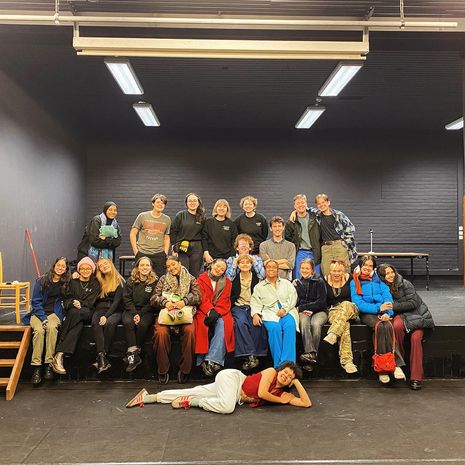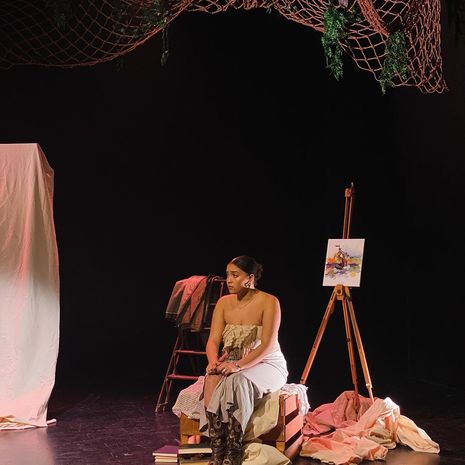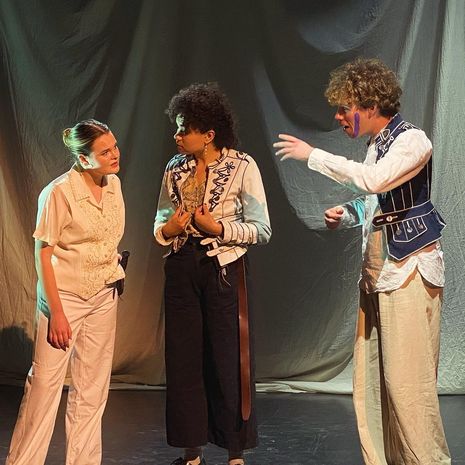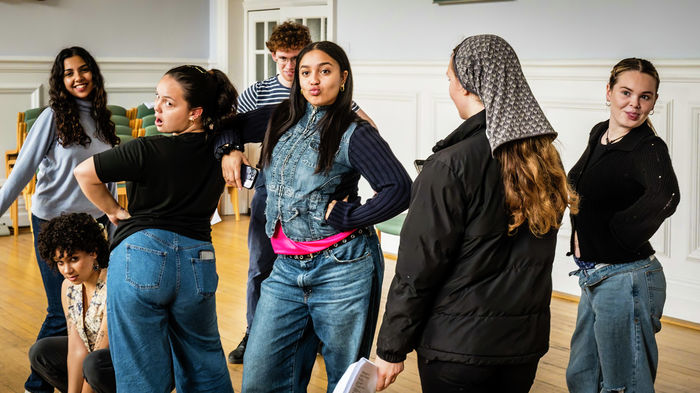‘What’s best is home soil’: The European Theatre Group returns from tour
Milly Kotecha sits down with president Jacob Gaskell and co-director Kez Prescod to talk Shakespeare, innovative adaptation, and getting stuck at the Swiss border

“I got back home and crashed,” admits Jacob Gaskell, the current tour manager and president of the European Theatre Group (ETG). I expect this would be a familiar experience for many of us after an exciting yet “in and of itself exhausting” term at Cambridge but imagine the extra level of “pent-up fatigue” when you have spent the first two weeks of December travelling around Western Europe by coach to perform The Tempest at a range of different venues - which is exactly what the ETG did. You know their schedule was jam-packed when Gaskell proclaims himself “one of the lucky ones” for being able to visit one supermarket in Montreux in Switzerland, with the rest of the troupe too wrapped up in the two shows and six workshops during their 24 hour stint to explore the stunning Swiss city.
The ETG started touring in 1957. This year, their tour commenced on December 2nd when a group of twenty-four Cambridge students, including Gaskell and one of the co-directors Kez Prescod, began their journey across France, Belgium, Germany, and Switzerland to present their innovative version of this Shakespeare classic to audiences spanning eleven-year-old French schoolchildren to Swiss university students, even to university professors.

I marvel at the difficulty of tailoring any show - let alone a Shakespeare play - to such a vast demographic, especially considering that English wasn’t the first language for many in their audience. Gaskell states that it is exactly this “broad appeal” which makes the ETG stand out as a theatre company. Prescod adds that it creates this beautiful outcome where each person can appreciate a different aspect of the production. University students picked up on the manipulation of the text to reveal a critique of colonialism, while the school students appreciated the singing and dancing.
Moreover, this challenge of mass appeal forced innovation and creativity, resulting in a dynamic production which is both accessible and relevant. Prescod speaks about the use of paint and art on stage, producing a medium through which audience members who may have been lost in the narrative could see the tensions within the play realised visually. This supports their re-interpretation of the text in which they portray Prospero as a tortured artist. Another distinctive creative decision taken by the directors was to change the gender of Prospero, traditionally a male character, to a woman. Prescod explains how Prospero’s art became a visual representation of how her powers manipulate the people around her, which removes the possibility of the audience sympathising with a coloniser – a highly appropriate choice for their “direct post-colonial reading” of The Tempest. However, as engaging as this abstract use of art forms is for the audience, it is equally a challenge for the actors, who had “a heck of a lot of paint to wash off at the end of each show.”
“This challenge of mass appeal forced innovation and creativity”
What is special about the ETG is their extensive process. This is not just in terms of rehearsals and performances, but the logistical side of preparing for such a great undertaking. Gaskell is keen to emphasise the amount of work that went into arriving at a particular place at a particular time, with the process of contacting venues, coach companies, and creating an itinerary beginning in April 2023. It was this effort over the course of the year which allowed them to be a “smooth machine on tour” ... for the most part at least. Between nearly losing someone at a service station in Germany (not to panic – she was just asleep on the back of the coach), turning up at the chalet for their weekend break to find there were no washing machines, or a sudden reroute around Geneva due to Swiss customs not being open on Sunday to check their specialised theatre lighting, they had their fair share of anecdotes.
“That should be what your next show is about”, I joke.
Gaskell replies, amused, that he doesn’t know how many people would be interested in that.

Despite these minor heart-attacks, the sense of passion put into the show, as well as the close-knit community built up between the team, really came across. Prescod’s endearing statement, “coach time was the best time”, summarises, for me, the magic of the ETG experience. My fellow thespians will agree that the end of a show is always bittersweet, as each member of the cast and crew ultimately parts ways. This sentiment was shared by both Prescod and Gaskell: “It’s weird to have spent two weeks so closely with everyone and then no time with them at all afterwards. I’m excited to see everyone!” Prescod answers when I ask how they feel in the approach to their last crusade.
“The sense of passion put into the show, as well as the close-knit community built up between the team, really came across”
After a well-deserved break over Christmas (“though what is a relaxing holiday when going to this university?” Prescod quips), the final run of The Tempest will be at the ADC Theatre from the 16th to the 20th of January. When I ask if there are any elements of the show that they will adapt for the ADC, considering the amount of space and equipment which will be available to them in comparison to the majority of venues they performed in during their tour, Gaskell comments on the innate “malleable” nature of the show, which means that the main difference with their home run will just be that the ADC is “nicely familiar” and a “return to normalcy”.
In the end my curiosity gets the better of me; I probe about the grand celebrations awaiting the team after their final curtain call. Amongst vague talks of an after party, Prescod comes through with a very relatable response: “I think we’ll find ourselves in Spoons. We’ve been to so many random European pubs and bars, but what’s best is home soil – anything which means we can spend a little bit of time together.” Although I did personally quite enjoy the notion of “some prancing around the ADC stage.”
Whatever form their celebrations take, they will be testament to months of hard work invested by every person within the ETG to make a tour of this magnitude possible. In the end, the result is an incredibly rewarding experience for both the company and the audiences alike, and I look forward to seeing what the ETG has in store for next year’s tour.
 News / Proposed changes to Cambridge exam resits remain stricter than most7 May 2024
News / Proposed changes to Cambridge exam resits remain stricter than most7 May 2024 News / Cambridge students set up encampment calling for Israel divestment6 May 2024
News / Cambridge students set up encampment calling for Israel divestment6 May 2024 Features / Cambridge punters: historians, entertainers or artistes? 7 May 2024
Features / Cambridge punters: historians, entertainers or artistes? 7 May 2024 Sport / The ‘netball girl’: myth or reality?7 May 2024
Sport / The ‘netball girl’: myth or reality?7 May 2024 Theatre / A nuanced and neurodivergent Carrie comes to the ADC6 May 2024
Theatre / A nuanced and neurodivergent Carrie comes to the ADC6 May 2024






